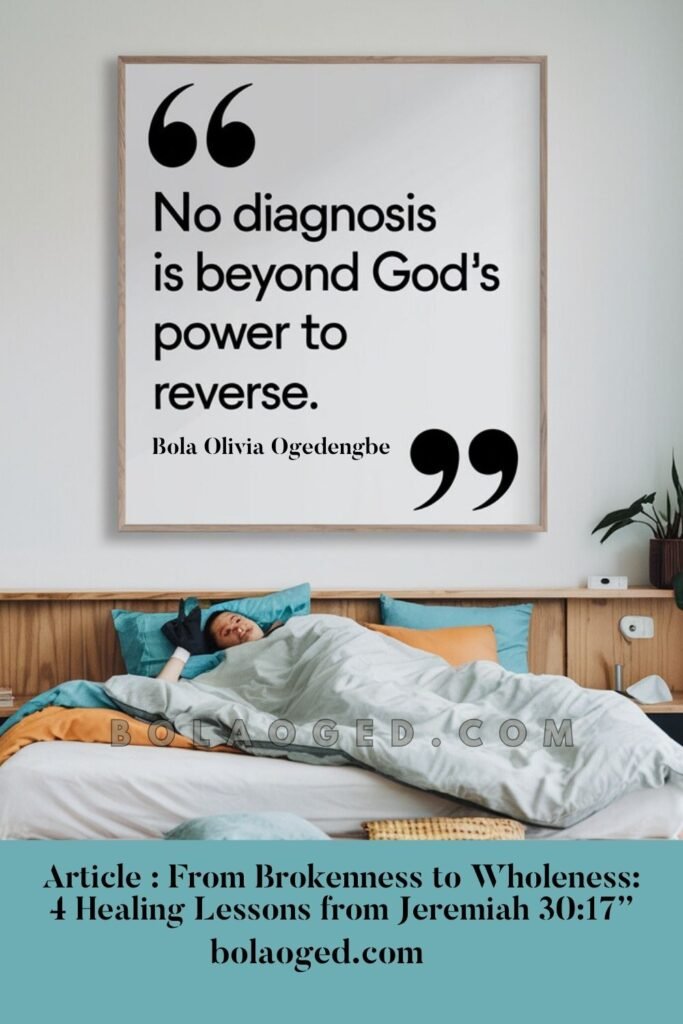Jeremiah 30.17 But I will bring you health and will heal you of your wounds — this is the LORD’s declaration — for they call you Outcast, Zion whom no one cares about.
What is happening in Jeremiah 30 ?
The times are dark, Judah is experiencing judgement and the destruction of Jerusalem is imminent. They carry a heavy burden of guilt stemming from their countless transgressions. There is no cause for joy, fear has overwhelmed the land, and it seems the end has finally come. Jeremiah unwaveringly proclaimed God’s judgment, often at significant personal cost. He told the people that their resistance is pointless, the city will fall, and they will be taken captive. Their freedom and land gone, their lives will forever be changed. The prophet’s words describe a terrified people, destined for a life without peace. He describes a staggering vision of men consumed by fear, resembling women in labour, their faces drained of all color. The distress is great.
And yet the word of the Lord comes to Jeremiah. He is instructed to write in a book what he is told, and this time, the message is one of hope. Despite their past egregious ways, and the impending destruction and exile, the Lord promises that Israel and Judah will eventually return to their land. They will be released from captivity and dwell in peace, without fear. In contrast, He will punish the nations that have scattered and plundered them and brought destruction to them. This is the background and sentiment expressed in this chapter. Then comes the promise of healing which we will now examine.
The promise of healing in Jeremiah 30.17
The verse beautifully portrays God’s kindness in healing the wounds of His people and restoring their health. The concepts of healing, health, and wounds are both literal and metaphorical, resonating deeply with those returning from years of exile. For some, these words serve as a metaphor for reversing political devastation, while for others—including myself—they speak to physical and emotional healing. Many of those returning from exile would have faced physical afflictions and diseases, not only as a consequence of their time in exile but as part of the broader human condition. They are promised the miraculous intervention of divine healing.
The experience of exile left many feeling abandoned and confused, yet God promises to heal these profound emotional wounds and restore a sense of wholeness. The people had committed enormous sins and were burdened with guilt. King after king had led them down a path of idolatry and grievous moral failure. The glory of God had departed from the temple, which was eventually destroyed, leaving them spiritually bankrupt. Yet God promises to heal them, to restore their relationship with Him, and to renew their sense of His favor. This prophecy applies not only to individuals but also to the entire nation of Judah.

The promise of healing also encompasses the restoration of their land, community, and national identity. It signifies a return to prosperity and the rekindling of their collective sense of purpose. Exile had been a dark period—a national tragedy that left deep scars on the collective psyche of the people. Yet God promises to heal these wounds and restore the nation. Though other nations had called them outcasts and treated them with disdain, God declares that He will honor them. This promise emphasizes the contrast between their current suffering, their immediate future, and the hope of the time when God’s promise will be fulfilled.
4 Healing lessons from Jeremiah 30.17
The beauty of taking time to reflect on the circumstances surrounding these healing scriptures lies in the remarkable perspective they offer on God’s consistent attitude toward sickness and affliction, whether physical or emotional. While God is speaking directly to Israel under very specific circumstances, the nature of God revealed in these passages is timeless and applicable to us today. His character and ways inspire us to trust in His promises. What an encouragement it is to see such a great promise emerge in the midst of personal and collective failure! This moment, often called the darkest in Israel’s history, was not the end. God’s faithfulness remained steadfast, and He stepped in to rescue them. How vital it is for us to reflect on these truths! From this promise, we can glean several important lessons:
1. The ever-willingness of God to heal
Are we undeserving of healing? Absolutely. Have we committed sins that could, by all logic, cause God to withhold His healing? Certainly. But is that how God operates? Absolutely not. God pronounced judgment on His people, but He immediately revealed His heart by offering them a promise of restoration. This underscores the incomparable mercy of God. He is always willing to heal, restore, and bring His people back into a state of blessing and relationship with Him. That is the first and most foundational lesson of this Scripture. On this basis, we can confidently approach Him, knowing His willingness to heal and restore.
2. The Limitless Forgiveness and Compassion of God
Some may admit, “I know God is willing to heal, but I’m responsible for my condition. My poor choices put me here.” Guilt often runs deep, convincing people that they deserve their suffering or that they must endure it as punishment. They resign themselves to living with the affliction for the rest of their lives. Even if they pray, they may secretly doubt whether healing is possible because they feel unworthy. Some struggle even to ask for healing, stunned at the idea that God’s mercy extends to them and that Jesus will heal them.

Israel’s calamity was self-inflicted. Their persistent idolatry and rebellion brought about their suffering, and by all standards, they had forfeited any claim to God’s help. Yet, even before their punishment, God promised forgiveness, restoration, and healing. This same mercy is available to us. We must stop dwelling on what we did wrong and focus instead on His boundless forgiveness and compassion. When we abandon regret and self-recrimination and throw ourselves on His mercy, we are delivered from the sense of unworthiness. This frees us to receive healing more readily.
3. Every Extreme Diagnosis is Reversible
No diagnosis is beyond God’s power to reverse. God promised to restore the desperate condition of Israel and Judah, and He delivered on that promise. He has both the will and the ability to bring life where there seems to be none. Yet, when we face dire diagnoses, hope can wane, and our minds may be overwhelmed by thoughts of permanence and despair.
In such times, we must remember how God has repeatedly reversed hopeless situations to display His glory. Consider the wounds—psychological, emotional, and physical—that the people returning from captivity would have carried. They were a nation of outcasts, barren and forsaken, yet God reversed their condition. This pattern is echoed in the ministry of Jesus, who turned no one away, healed incurable diseases, raised the dead, and continues to do so today.
4. Total Restoration is Available
We have established that God is willing to heal, that His mercy covers our guilt, and that no circumstance is beyond His power to reverse. From this foundation, we can confidently seek total restoration. Whatever the nature of the affliction—physical, emotional, or spiritual—God promises complete restoration.
Mental and emotional torment, on their own, can be debilitating and even trigger physical illness. Yet the heart of God is to heal every wound and to demonstrate the fullness of His love and acceptance. Ask for and believe in total restoration. Receive the power of God to destroy every affliction. Receive deliverance from rejection, and declare that you are no longer an outcast. Trust in God’s promise to restore wholly and embrace His abundant love and acceptance.
Remember the man by the pool of Bethesda; He went from desperation to deliverance. He had laid there in despair watching other people jump in the pool when it was stirred and walk away healed, and he had no hope. But Jesus came along and gave him total restoration and his life was never the same again.

Final word on Jeremiah 30.17
Jeremiah 30:17 reveals God’s heart—a God who heals, restores, and turns despair into hope. Even in the darkest moments of failure, He does not abandon His people but extends His mercy and power to bring healing to every area of life: physical, emotional, spiritual, and communal. This promise reminds us that no situation is beyond God’s ability to reverse. His faithfulness guarantees restoration for those who turn to Him. Today, we can approach Him with boldness, not because we are deserving, but because His mercy and love know no bounds.
Hold fast to this truth: You are not forsaken. You are healed, restored, and cherished by the God who makes all things new. Trust Him to bring wholeness and beauty into every area of your life, for His promises are sure and His love never fails.
